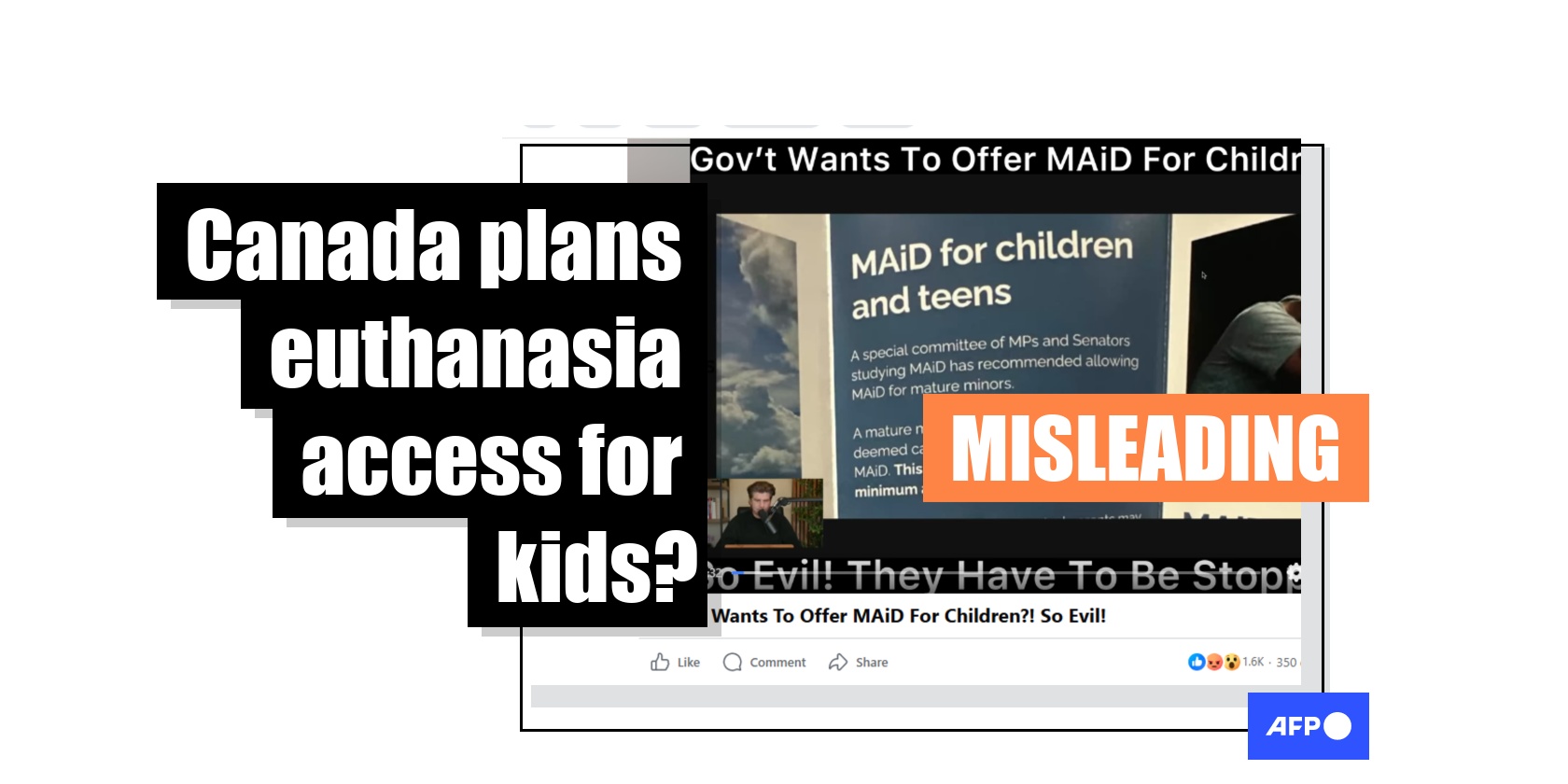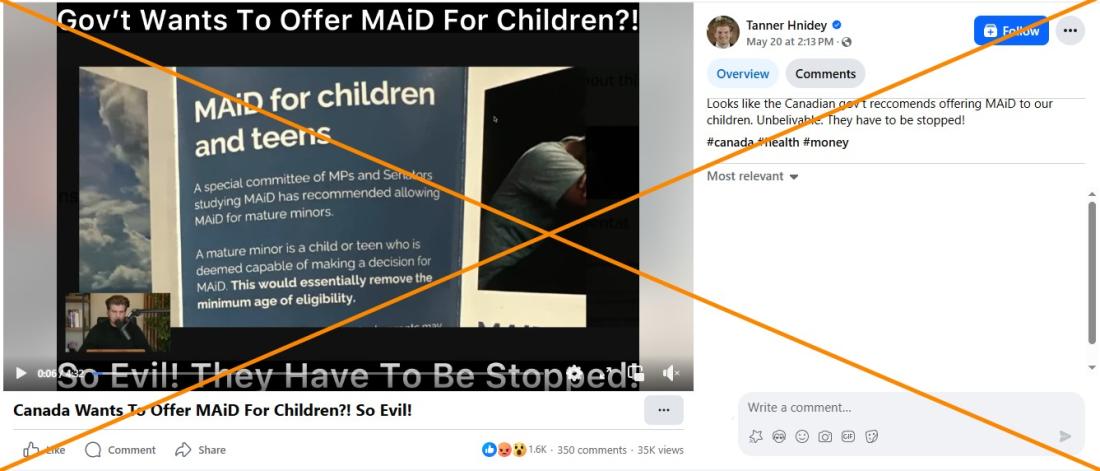
Flyer does not prove assisted death legal for minors in Canada
- Published on June 3, 2025 at 23:24
- 4 min read
- By Gwen Roley, AFP Canada
"Looks like the Canadian gov't reccomends (sic) offering MAiD to our children," says the caption of a May 20, 2025 video shared on Facebook. "Unbelievable! They have to be stopped!"
The clip, viewed more than 35,000 times, includes images of what appears to be a brochure discussing a recommendation from Canadian lawmakers to expand assisted dying to mature minors.
Similar claims citing the pamphlet as alleged proof of changes to MAID spread in online articles and on X, TikTok and Instagram.


The posts gained traction as bills allowing assisted death are currently under debate in France and the United Kingdom.
Canada first legalized MAID, intended for people with a "grievous and irremediable" medical condition, in 2016 (archived here). Different forms of euthanasia are also legal in other jurisdictions outside Canada.
Initially, a person's natural death had to be "reasonably foreseeable" to be granted the procedure, but updates in 2021 opened eligibility to people whose deaths were not immediately imminent (archived here).
False and misleading claims about MAID in Canada frequently surface online, often in posts alleging the program is being opened up to children.
In 2023, a parliamentary committee did recommend that mature minors should be given the right to choose MAID. But as of June 3, 2025, people under 18 years old have never been eligible for the procedure in Canada.
"The eligibility criteria set out in the Criminal Code require that a person must be a minimum of 18 years of age and capable of making decisions with respect to their health," said Mark Johnson, spokesman for Health Canada. "The Government of Canada is not considering any legislative changes to this requirement that minors cannot be assessed for nor receive MAID."
Additionally, a reverse image search reveals that the pamphlet highlighted online was printed by the Evangelical Fellowship of Canada in 2024, as part of a push to discourage the expansion of access to the procedure (archived here). It did not come from the Canadian government, as the posts imply.
Studies and recommendations
A Special Joint Committee on Medical Assistance in Dying studied issues related to MAID between 2021 and 2023 (archived here). During this time, individuals, experts and advocacy groups presented their points of view on what could be changed in Canada's approach to assisted death.
Following the testimonies, the committee recommended that mature minors should be eligible to access MAID with safeguards in place, including restrictions limiting requests for people under 18 years old to only those whose deaths were reasonably foreseeable (archived here).
The government responded to the recommendation with concerns about balancing minors' personal autonomy with safety, and it did not include any provision allowing medically assisted death for people under 18 (archived here).
"This could only happen if legislation was introduced and passed to change the Criminal Code," said Alisha Hall, spokeswoman for Dying With Dignity Canada, a group that advocates for mature minors to be allowed the right to choose MAID.
Hall told AFP that since Dying With Dignity's report to the committee in 2022, it had not made any further presentations to government bodies on MAID and mature minors (archived here).
Eligibility
While some of the posts referencing the pamphlet also implied that MAID could be used by those dissatisfied with life, Canada requires an applicant to have a "grievous and irremediable" medical condition.
According to the Justice Canada website, MAID applications need to be approved by at least two medical professionals, and information must be provided about how to withdraw a request (archived here).
The ministry also says people applying for the procedure who do not have reasonably foreseeable deaths must be informed about alternative options of treatment.
The latest annual report on MAID recorded that 95.9 percent of people who received the procedure in 2023 did so while their deaths were reasonably foreseeable, with cancer being the most frequently cited underlying condition (archived here).
Those whose deaths were not foreseeable reported living with issues such as diabetes, frailty, autoimmune problems and chronic pain, according to the report.
Some argue the availability of the procedure can leave other issues unaddressed, including those surrounding quality of life for people living with disability or in poverty. Media have previously reported on applicants seeking medically assisted death for social reasons including isolation, and practitioners struggling with requests for MAID from people living with disabilities or difficult economic situations.
Offering MAID as an option for people suffering solely from a mental illness was slated to go into effect in 2024, but this change was postponed until at least March 2027 (archived here).
Read more of AFP's reporting on misinformation in Canada here.
Copyright © AFP 2017-2026. Any commercial use of this content requires a subscription. Click here to find out more.
Is there content that you would like AFP to fact-check? Get in touch.
Contact us
